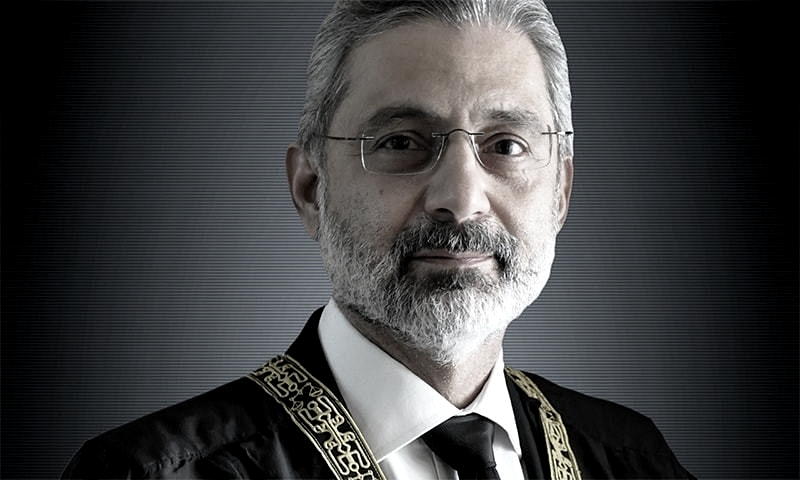Pakistan
CJP Qazi Faez Isa opens the door for horse-trading and paves way for constitutional amendments
Principles of law and procedure were blatantly defied by the Chief Justice of to render the 63-A review decision. SC’s verdict now paves way for constitutional amendments by an illegitimate government.

Principles of law and procedure were blatantly defied by the Chief Justice to render the 63-A review decision. SC’s verdict now paves the way for constitutional amendments by an illegitimate government.
In a major relief to the government, Qazi Faez Isa’s supreme court strikes down the 2022 ruling on the defection clause under Article 63-A of the Constitution of Pakistan.
On Thursday, October 3, 2024, the Supreme Court unanimously accepted a review petition against its 2022 verdict concerning the defection clause under Article 63-A of the Constitution. In its May 17, 2022 decision, the SC ruled that votes cast against the parliamentary party lines in four specific instances outlined in Article 63-A should not be counted.
The instances referenced are:
- the election of the prime minister and chief minister,
- a vote of confidence or no-confidence,
- a constitutional amendment bill, and a money bill.
Article 63-A(b) of the Constitution of Pakistan notes the disqualification on grounds of defection and says:
“If a member of a Parliamentary Party composed of a single political party in a House votes or abstains from voting in the House contrary to any direction issued by the Parliamentary Party to which he belongs, in relations to:
- election of the Prime Minister or the Chief Minister; or
- a vote of confidence or a vote of no-confidence; or
- a Money Bill or a Constitution (Amendment) Bill;
he may be declared in writing by the Party Head to have defected from the political party, and the Head of the Parliamentary Party may forward a copy of the declaration to the Presiding Officer, and shall similarly forward a copy thereof to the member concerned:
Provided that before making the declaration, the Party Head shall provide such member with an opportunity to show cause as to why such declaration may not be made against him.

Today’s ruling on article 63-A review petition sets aside the previous ruling, meaning that the votes of parliamentarians who vote against party policy will now be counted.
This new verdict, pronounced by Chief Justice of Pakistan (CJP) Qazi Faez Isa, provides significant relief to the government, especially in its attempt to gather the required number of votes to support the proposed constitutional amendments, several of which pertain to the judiciary.
The 2022 decision, in response to a presidential reference filed by then-President Arif Alvi, was a 3-2 split, with then-CJP Umar Ata Bandial, Justice Ijazul Ahsan, and Justice Munib Akhtar being the majority verdict authors. Justices Mazhar Alam Khan Miankhel and Jamal Khan Mandokhail dissented, arguing that any further interpretation of Article 63-A would amount to “rewriting or reading into the Constitution.” The Supreme Court Bar Association (SCBA), the petitioner in the case, held the same view.
Defiance of the law and legal procedure
According to law, a review petition should be heard by the same bench that presided over the previous ruling, unless a judge retires or chooses to recuse. In this case, Justice Munib Akhtar was supposed to be part of the bench. However, in what critics describe as a blatant violation of legal procedure, Chief Justice Qazi Faez Isa formed a new bench, defying the legal procedures.
Moreover, a three-member committee, consisting of the Chief Justice and the two most senior judges of the Supreme Court, must constitute the bench. This committee was comprised of CJP Qazi Faez Isa, Justice Mansoor Ali Shah, and Justice Munib Akhtar. However, following a presidential ordinance, Justice Munib Akhtar was replaced by Justice Amin Uddin, favoured by Qazi Faez Isa.
Further complicating matters, Justice Qazi Faez Isa and Justice Amin Uddin constituted the bench in the absence of Justice Mansoor Ali Shah, which is another violation, as a bench cannot be formed without all members of the committee present.
Consequences of Review of Article 63-A
The Supreme Court’s decision to overturn the original 63-A verdict now opens the door to potential horse-trading in parliament, as it provides immunity to dissident votes.
More alarmingly, this decision by Qazi Faez Esa’s Supreme Court has essentially given a green light to agencies and authorities to abduct parliamentarians and their family members, including wives and daughters, to blackmail and coerce them into voting for constitutional amendments.
In September 2024, the wife and daughter of PTI MNA Saad Baloch were abducted as part of a strategy to pressure PTI members into switching sides and supporting the ruling elite’s ‘unconstitutional’ amendments and bills.
The first consequence of the Article 63-A review decision was witnessed just hours after the Supreme Court’s verdict, when the home of a PTI MNA’s uncle was raided and vandalized by authorities in the night, with the sole purpose of coercing the parliamentarian to vote in favour of the constitutional amendments.
Later, the son of PTI MNA Riaz Fatyana, Ahsan Fatyana, was abducted by authorities following a raid on his home at 3:30 a.m. on Friday, October 4, 2024.
Opposition members and legal experts have harshly criticized the Chief Justice’s actions, arguing that his decisions have not only undermined the judiciary’s authority but have also weakened the rule of law and damaged the country’s democracy.
